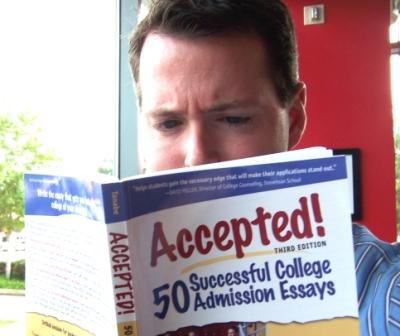The College Admissions Essay Part II: Beyond gimmicks and hooks
We talked yesterday about the importance of voice in your college application essay. Today let’s discuss the second insight your college application gives our admission officers, specifically, how you put your thoughts together to convey a point.
In college a buddy of mine introduced me to a friend of his at a party like this, “Hey man, I want you to meet Thom. [motioning to me and continuing to his friend] He’s like really funny.” After the cordialities and and “nice to meet you’s” it was, well, awkward. The yoke of funny was unexpected and darn heavy. Trying to tell us you’re a leader (for example) in a college essay, versus showing us, is a lot like that.
There is a truism in life that in our haste, we’d rather tell others something than have to show others something. You may well be a leader, but just like your calc teacher, we’re going to ask that you show your work. In the essay, this means paying particular attention to the details of how you write. Beyond the basics covered yesterday (grammar and diction) the order and organization of your essay, the words you choose, and the depth of your description of your topic all speak to how you make sense of the world around you.
Here are a couple of real examples, with my general take-a-ways from reading it:
- “During that [mission] trip [to Kenya] I was struck by how the villagers went about their days in such happiness even though they had very little.” -This is a common sentiment, intended to contrast cultures and depict the perception that people of greater means have more troubles while those with less means lead simpler lives. However, it conveys an overly simplistic worldview, and makes me worry about the commitment that individual has to deeply understanding social and human conditions.
- “I describe myself as an ‘out-of-the-box’ thinker.” -A kind of oxymoron if you think about it, in that the phrase is a very common cliché, and challenges how out-of-the-box the writer really is. Being an unconventional thinker is more clearly conveyed by unique descriptions and word choice.
- “Reflecting back on it, winning that [big] game for our team changed me in immeasurable ways.” -A fine sentiment so long as the next sentence ushers in a reflection on how that event changed you. It’s not enough to recount an event and just say that it changed you, let us in on your introspection on that event. It conveys your values and what you find important in life (i.e., saying that “it changed you because you experienced for the first time the inter-dependence of a true team environment” conveys that your worldview includes those around you, not just you).
The reason your AP English teacher tells you to write succinctly is because the practice of doing so forces your mind to first focus on an argument, and then support that argument with relevant evidence, the true mark of an educated mind. The reason we ask you to do that in your college essay is to show us the culmination of this practice. We’re looking to understand how you think, how you engage concepts and ideas as a projection of your fit with our intellectual community (i.e., our classes, Commons houses, etc).
It goes beyond the OCD (see yesterday’s post) gimmicks like having a “hook” or some odd essay format (like a second person account of a conversation between the applicant and God – a topic listed as “can’t miss” in one of those guidebooks at the mega-bookstore). Clear message, well thought out voice, and solid writing and editing. Simple right?

